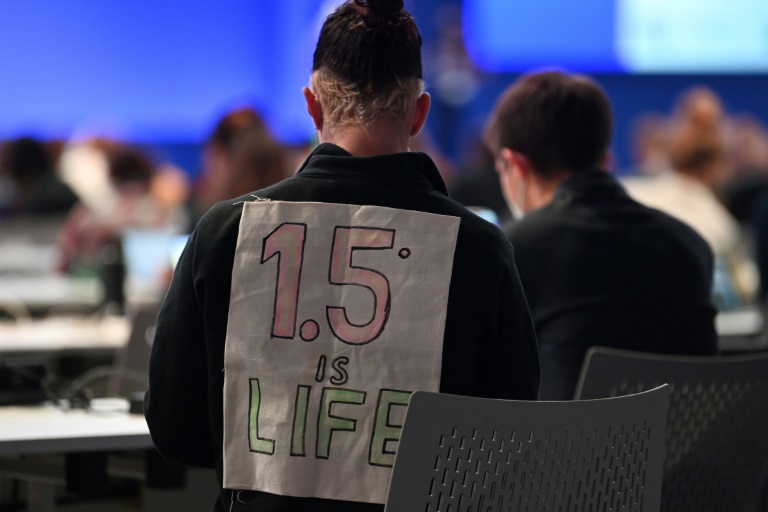US climate envoy John Kerry told COP26 that fossil fuel subsidies were “insanity” Friday as countries laid out their red lines in the final hours of high stakes negotiations.
Delegates from nearly 200 nations are frantically seeking a resolution to the summit, which aims to keep the goal of limiting temperatures to 1.5 degrees Celsius, as global warming-driven disasters hit home around the world.
“We believe that this is existential,” US climate enjoy John Kerry told delegates.
“For many of you it is not existential in the future, it is existential today. People are dying today. All around the world the impacts are being felt, today.”
Kerry said trillions of dollars had been spent in the last five or six years on subsidising the polluting fossil fuels driving climate change: “That is the definition of insanity.”
Kerry was addressing a COP26 “stocktake”, the public hearing that allows countries to raise concerns over the texts negotiated so far.
New wording on Friday called for countries to accelerate “the phase-out of unabated coal power and of inefficient subsidies for fossil fuels”.
That was softer than a first iteration of the text, but observers said the inclusion of the fuels driving the climate crisis was an important step.
“Unabated” coal plants are those that do not deploy carbon capture technology to offset some of their pollution.
The text requests countries to come back next year with updated climate pledges.
It also fleshes out other key areas of contention, including calling on developed countries to “at least double” their funding for adaptation — helping at-risk nations face climate impacts — by 2025.
But a faultline remains over the failure of wealthy nations to meet their decade-old promise to provide $100 billion to help vulnerable nations green their grids and prepare for the worst impacts of climate change.
The sum was due in 2020 and is not expected to be met until 2022 at the earliest.
Kenyan environment minister Keriako Tobiko told delegates that failure to honour the funding pledge had severely hurt confidence.
“For myself, for Kenya, our trust has been shattered,” he said.
– ‘Stark reality’ –
The two-week summit began with a bang as world leaders descended on Glasgow armed with a string of headline announcements, from a commitment to slash methane emissions to a plan to save the rainforests.
Host Britain says it wants COP26 to lead to commitments from countries to keep the 1.5C temperature cap goal of the Paris agreement within reach.
However, current national emissions cutting plans, all told, would lead to 2.7C of heating.
In a speech to delegates, European Commission Vice President Frans Timmermans held up his mobile phone with a picture of his one-year-old grandson on screen.
“If we fail — and I mean fail now in the next few years — he will fight with other human beings for water and food. That’s the stark reality we face,” he said.
He said the goal of limiting global warming to 1.5C is “about avoiding a future for our children and grandchildren that is unlivable”.
– ‘Saving lives’ –
Negotiations received a shot in the arm on Wednesday when the United States and China — the two largest emitters — unveiled a joint climate action plan, although it was light on detail.
One of the main sticking points at the summit is finance, with developing nations insisting on more money for adaptation that can help them brace for future climate shocks.
Countries already battered by climate disasters such as record-breaking drought and flooding are also demanding they be compensated separately for “loss and damage”.
Developed nations meanwhile favour a greater push on emissions reductions, something countries yet to fully electrify their grids — and largely blameless for emissions — feel is unfair.
“Rich nations treat climate finance as charity or a favour to placate developing countries into signing a compromised package of decisions,” Harjeet Singh, senior adviser at Climate Action Network International, told AFP.
“We are talking about saving lives and undoing an injustice to build a safe future for all.”
Organisers said the draft texts dedicated an “unprecedented” section to loss and damage, but vulnerable nations said it stopped far short of their expectations.
Other issues likely to delay an agreement in Glasgow include a long-simmering dispute over the rules governing carbon markets, and common reporting timeframes.









